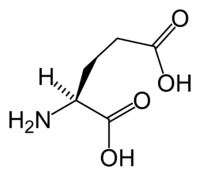
Photo from wikipedia
Interleukin-6 (IL-6) is a pleiotropic cytokine that plays pathogenic role in type 1 diabetes (T1D). Therefore, anti-IL-6 receptor antibody, tocilizumab, used for the treatment of rheumatoid arthritis (RA), is considered… Click to show full abstract
Interleukin-6 (IL-6) is a pleiotropic cytokine that plays pathogenic role in type 1 diabetes (T1D). Therefore, anti-IL-6 receptor antibody, tocilizumab, used for the treatment of rheumatoid arthritis (RA), is considered a candidate for immune intervention in T1D. Here, we report the case of a 73-year-old woman (HLA-DR9-DQ3 homozygote) with well-controlled RA who developed T1D while receiving tocilizumab treatment. At 57 years of age, the patient was diagnosed with RA, for which she underwent tocilizumab therapy that enabled complete suppression of her joint inflammation. Seventeen months after starting tocilizumab therapy, she noticed polydipsia, polyuria, general fatigue and weight reduction (-2kg/month), and was diagnosed with T1D with diabetic ketoacidosis based on an arterial pH of 7.26, serum ketone body of 7,437μmol/L, blood glucose level of 925mg/dL, HbA1c of 13.2%, and the presence of anti-islet autoantibodies. This case report illustrates valuable insight concerning the effect of anti-IL-6 receptor antibody therapy on T1D prevention.
Journal Title: Journal of diabetes investigation
Year Published: 2021
Link to full text (if available)
Share on Social Media: Sign Up to like & get
recommendations!